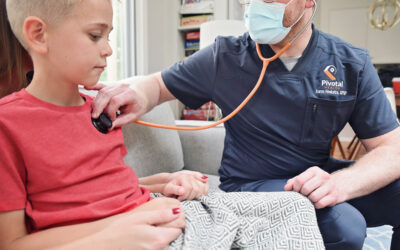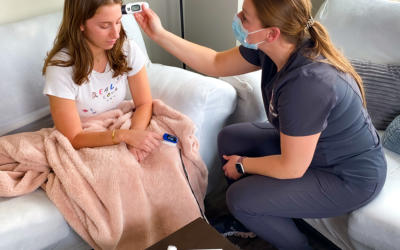Your Essential College Student Health Guide
One of the most challenging aspects of sending your child to college is worrying about their health and safety, especially when they’re far from home. That first phone call when they’re sick can be unsettling, particularly if they need urgent care.
While some college students can access convenient house calls at their dorm or apartment through Pivotal Health, all students should know how to care for themselves when ill and navigate urgent care away from home. Preparing your college student to handle common illnesses and seek appropriate care before they leave for college will boost their confidence and provide you with peace of mind.
In this article, we share tips from Pivotal Health clinicians to help parents prepare their college students for managing illnesses and seeking urgent care while away at college. These practical strategies will empower your student to make informed health decisions, ensuring they’re ready to handle medical situations independently.
What Should My College Student Know About Illnesses?
Your student may have a general understanding of common illnesses and injuries, but it’s important to talk to them specifically about how to take care of themselves and when to seek urgent care.
Discuss the symptoms of common illnesses they might get in college, such as:
- Pink eye: Redness, itching, discharge, and swelling of the eye
- Influenza: Fever, body aches, fatigue, cough, and headache
- Common cold: Runny nose, sore throat, cough, and mild fatigue
- Ear infection: Pain or discomfort inside the ear, feeling of fullness in the ear, muffled hearing, and possibly fever
- Strep throat: Severe sore throat, fever, and swollen lymph nodes
- Gastroenteritis (stomach flu): Nausea, vomiting, diarrhea, and abdominal pain
- Mononucleosis: Extreme fatigue, sore throat, fever, and swollen lymph nodes
- COVID-19: Fever, dry cough, fatigue, loss of taste or smell, and shortness of breath
- Urinary tract infection (UTI): Frequent urination, burning sensation when urinating, and pelvic pain
- Sexually Transmitted Infection (STI): Unusual discharge, pain or burning sensation during urination, sores, bumps, or rashes, itching, pain during sex
- Bronchitis: Persistent cough, chest discomfort, fatigue, and mild fever
- Meningitis: Severe headache, stiff neck, fever, and sensitivity to light
- Food poisoning: Nausea, vomiting, diarrhea, and abdominal cramps
Make sure they know about viruses and bacteria — and how antibiotics don’t work on viruses. Also, it typically takes 48 to 72 hours for people to begin to feel better while taking antibiotics. This knowledge can help them have more informed conversations with healthcare providers and understand their treatment options better.
What Self-Care Tips Should Your College Student Know When They’re Sick?
Preparing your college student to handle minor illnesses on their own is important for their health and independence. Here are some self-care tips to share with your college student:
- Prioritize rest: Encourage your student to prioritize sleep when they’re feeling under the weather. This might mean skipping non-essential activities to get extra rest.
- Stay hydrated: Drinking plenty of water, herbal tea, and clear broths can help fight dehydration, especially with illnesses involving fever or diarrhea.
- Over-the-counter medications: Teach your student about appropriate use of pain relievers, decongestants, and anti-diarrheal medicines. Ensure they understand proper dosages and potential side effects.
- Nutrition: While appetite might be low, eating small, nutritious meals can help maintain strength. Suggest easy-to-digest foods like bananas, rice, applesauce, and toast.
- Stress management: Being sick can be stressful, especially during exams or important events. Teach relaxation techniques like deep breathing or meditation.
- Hygiene practices: Remind them about the importance of frequent hand-washing, covering coughs and sneezes, and not sharing personal items to prevent spreading illness.
- Create a comfort kit: Suggest keeping a “sick day” kit in their dorm or apartment with items like tissues, throat lozenges, a thermometer, and their preferred over-the-counter medications.
- Know when to seek help: While self-care is important, make sure they understand when symptoms require professional medical attention.
Self-care tips can help them make it through minor illnesses, but you also need to educate them about when to seek medical attention, and what type of care they may need. Discuss signs that indicate a need for urgent care, such as high fevers, severe pain, or symptoms that persist or worsen over time.
What Should I Include In My College Student’s First Aid Kit?
A well-stocked medical kit can help your child manage mild illnesses or injuries on their own. Here’s a list of items to consider including:
- Bandages in various sizes
- Gauze pads and medical tape
- Antibiotic ointment
- Antiseptic wipes
- Loperamide (Imodium) for diarrhea
- Acetaminophen (Tylenol) for pain and fever
- Ibuprofen (Motrin) for pain and inflammation
- Digital thermometer
- Tweezers
- Scissors
- Hydrocortisone cream for itching
- Electrolyte rehydration mix
- Allergy medication (if needed)
- Any personal prescription medications
Make sure your child knows how to use each item in the kit and keep it in an accessible location. They should check medication expiration dates periodically and replace items as needed. This kit, combined with the knowledge of when to seek urgent care, will help your student manage minor health issues confidently while away at college.
How Can You Help Your College Student Manage Medication Refills?
Making sure that your college student can easily refill their medications will help them care for their health away from home. Here are some tips to help them with this process:
- Choose a pharmacy near campus: Help your student find and register with a pharmacy close to their college before they leave home.
- Set up mail-order prescriptions: For maintenance medications, consider setting up a mail-order service that can deliver refills directly to your student’s campus address.
- Use smartphone apps: Many pharmacies offer apps that make it easy to request refills and receive notifications when medications are ready.
- Understand prescription insurance coverage: Review your insurance plan’s policies on out-of-network pharmacies and teach your student how to use their insurance card.
- Keep track of refill dates: Encourage your student to set reminders for when they need to request refills, allowing enough time for processing.
- Have a backup plan: Ensure your student knows what to do if they run out of medication unexpectedly, such as how to connect with their doctor or reaching out to Pivotal Health for an emergency refill.
What Health Information Should Your College Student Know Before Leaving Home?
Before your child leaves for college, discuss their medical history, family health background, and potential health risks. Ensure they know their own medical history, including allergies, chronic conditions, and current medications. Help them to manage ongoing health issues like asthma or diabetes independently with necessary supplies on hand.
Don’t forget to mention significant health issues that run in the family. Some illnesses may first appear in young adulthood, so awareness of family health risks is important. This conversation empowers your college student to be an informed advocate for their own health.
How Do You Find Urgent Care For Your College Student?
Before your child leaves for college, take time to research urgent care and emergency care options. You may have a choice of university-run health services and urgent care clinics, however, consider more accessible alternatives like Pivotal Health, which has several important benefits for college students, such as extended evening and weekend hours, priority appointment scheduling for members, and the convenience of house calls.
Pivotal Health’s membership-based service offers unlimited urgent care house call visits with a unique advantage: licensed providers drive directly to your student, even in their dorm room or apartment. Parents with high-deductible health plans (HDHP) will especially appreciate Pivotal Health’s cost-effective membership model, which can help manage healthcare expenses.
Pivotal Health’s house calls eliminate the stress of navigating an unfamiliar city while feeling unwell. College students particularly appreciate scheduling urgent care house calls with the Pivotal Health app, booking clinicians for urgent care, primary care, and mental health services, all in the comfort of your student’s living space. This approach ensures your child can receive professional medical attention without the hassle of travel or waiting rooms.
Encourage Your College Student to Seek Urgent Care When Needed
Perhaps the most important tip is to encourage your child to seek help when they need it. Many college students hesitate to get medical attention, worried about costs or missing classes. Reassure your child that their health and well-being should always be the top priority, and that seeking prompt care can prevent minor issues from becoming major problems.
By equipping your student with knowledge about treating common illnesses, and convenient urgent care options like Pivotal Health, you’re setting them up for success. This preparation helps them stay healthy and builds their confidence to manage their own healthcare. With the right guidance, you can feel more at ease knowing your child is ready to handle health challenges while away at college.












